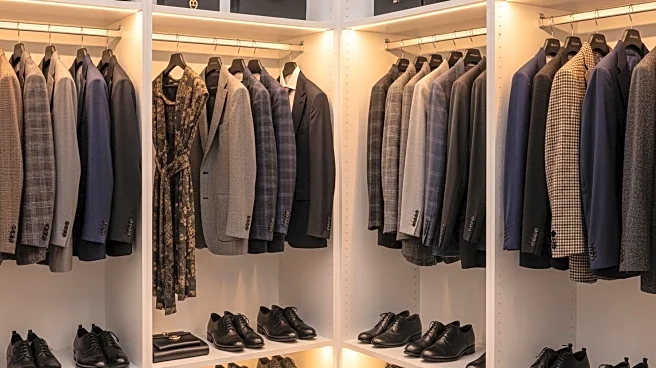What is the story about?
What's Happening?
Vestiaire Collective, a prominent second-hand fashion platform, has reported a significant increase in male participation in the luxury second-hand market. According to the company, one in five purchases on its site are now made by men, prompting an 88 percent growth in its offerings over the past three years. The platform has responded by launching a dedicated men's fashion category, which includes tailored recommendations and a bespoke shopping experience. Maximilian Bittner, the company's CEO, highlighted that menswear is becoming one of their most dynamic segments, with men seeking exclusivity, luxury at fairer prices, and resale potential. The typical male customer is younger, primarily from the Millennial or Gen Z generations, and focuses on ready-to-wear items, with sneakers and watches also being popular choices.
Why It's Important?
The growing interest of men in the luxury second-hand market reflects broader trends in fashion consumption, where value for money and sustainability are increasingly prioritized. This shift is significant for the fashion industry, as it opens up new market opportunities and challenges traditional gender norms in fashion consumption. By expanding its men's category, Vestiaire Collective is capitalizing on this trend, potentially increasing its market share and influencing other fashion retailers to follow suit. The rise in male buyers also suggests a cultural shift towards more inclusive fashion practices, where men are actively participating in a market traditionally dominated by women.
What's Next?
Vestiaire Collective's expansion into men's fashion is likely to encourage other second-hand platforms to enhance their offerings for male consumers. As the market grows, brands may increasingly focus on creating gender-inclusive collections that appeal to both men and women. Additionally, the trend could lead to more collaborations between luxury brands and second-hand platforms, offering exclusive items that cater to the demand for unique and sustainable fashion. The company may also continue to refine its marketing strategies to attract more male buyers, potentially influencing the broader fashion industry to adopt similar approaches.
Beyond the Headlines
The rise of men in the second-hand luxury market could have deeper implications for the fashion industry, including a shift towards more sustainable practices and a reevaluation of consumer behavior. As men become more involved in resale, it may challenge traditional perceptions of masculinity in fashion, promoting a more inclusive and diverse market. This trend could also lead to increased transparency in the fashion industry, as consumers demand more information about the origins and sustainability of their purchases.















